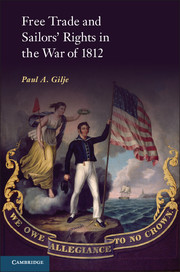19 - Dartmoor
Published online by Cambridge University Press: 05 March 2013
Summary
Regardless of the Federalist fulminations, and the truth of some of their accusations, free trade and sailors’ rights carried special meaning for the sailors who fought in the War of 1812. Jack Tar seized upon the phrase and made it his own. Common seamen like Samuel Leech would look back decades later and use Porter's motto to explain the determination of the men who fought on the high seas. The slogan was plastered on tavern signs everywhere. Sailors shouted it in public demonstrations and referred to it in private conversations. And they could both revere and mock the phrase in Dartmoor, the great and dismal prisoner-of-war compound in southwestern England that stood atop the bleak moor of the same name. Dartmoor itself became a symbol of sailors’ rights in the months after the signing of the Treaty of Ghent. Kept in confinement as diplomats wrangled over who would pay for their return passage, American sailors repeatedly expressed their own peculiar notions of liberty in defense of their rights, trying the patience of their captors until an explosion of violence by the prison guards left seven Americans dead and scores wounded. In the wake of the Dartmoor Massacre, as the tragic event quickly came to be known, there was a political uproar despite diplomatic efforts to sidestep the issue. Republicans were outraged by this brutal assault on American citizens and violation of sailors’ rights. Some Republicans even called for revenge and a renewal of war. Federalists agreed about the importance of protecting their countrymen, but were more moderate in their approach and defended the Anglo-American report on the affair. They also charged the Republicans with using the massacre for political purposes and then chided the Republicans for their failure to protect sailors’ rights and aid the returning prisoners of war. In the end, the hoopla over the massacre subsided. Dartmoor was added to the popular vocabulary as a byword for British brutality and as a symbol of the importance of sailors’ rights. However much the Dartmoor Massacre lived on in popular memory, free trade and sailors’ rights remained the central rhetorical phrase inherited from the War of 1812.
- Type
- Chapter
- Information
- Free Trade and Sailors' Rights in the War of 1812 , pp. 262 - 276Publisher: Cambridge University PressPrint publication year: 2013



